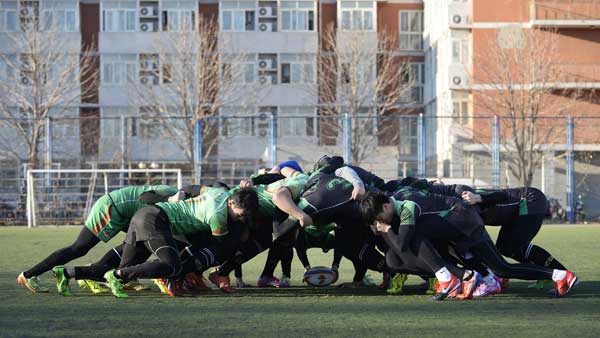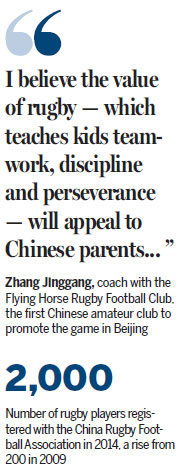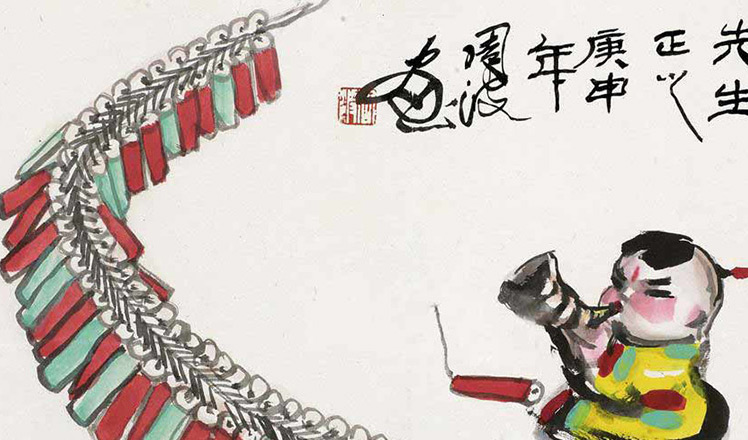Try, try and try again
Updated: 2016-01-22 08:12
By Sun Xiaochen(China Daily)
|
||||||||
 |
|
Members of the China Agriculture University rugby team are during a regular training on campus in Beijing on Dec 10. [Photo by Wei Xiaohao/China Daily] |
Rugby union is slowly, but surely, gaining a foothold in China. Now, enthusiasts are determined to raise its profile and dispel common misconceptions by boosting the game's appeal to the younger generation. Sun Xiaochen reports. 
Once just a popular pastime for expats, rugby union, especially the sevens version, has shaken off its niche status to gain wider acceptance among young Chinese participants and sports bodies.
Despite freezing weather and slight air pollution in Beijing on Saturday, the sight of about 20 children running with oval-shaped balls under their arms at a park in the capital's eastern downtown quickly attracted the attention of passers-by.
The children were participating in a two-hour training session as part of a promotion of youth rugby, albeit the less-physical version known as touch rugby.
The sessions started earlier this year by the Flying Horse Rugby Football Club - the first Chinese amateur club to promote the game in Beijing - were aimed at raising public awareness of the sport's educational value in contrast to its sometimes brutal appearance.
While the traditional format, played by teams of 15 per side, features physical contact and heavy tackling, touch rugby, in which players tag an opponent's body instead of tackling, is catching on with entry-level juniors.
Zhang Jinggang, a coach with Flying Horse, is confident that the game will eventually gain a foothold through grassroots participation, although it is nowhere near the sporting mainstream at present.
"Rugby has long been an instrumental part of education overseas, especially in countries such as Britain and Australia. I believe the value of rugby - which teaches kids teamwork, discipline and perseverance - will appeal to Chinese parents, who are beginning to care more about their children's overall development and not just academic excellence," said Zhang, who learned to play the sport in 1992 at the China Agriculture University in Beijing.
Recent setbacks
However, a recent setback at the national level has cast a shadow over the sport's growing popularity, and disappointed fans such as Zhang.
In November, both the Chinese men's and women's national sevens teams missed the opportunity to play in the 2016 Olympic Games in Rio de Janeiro by performing poorly in the Asian qualification tournaments, in which only the winners were awarded direct berths in the Rio Games.
- A glimpse of Spring Rush: little migrant birds on the way home
- Policy puts focus on genuine artistic students
- Police unravel market where babies are bought, sold as commodities
- More older pregnant women expected
- Netizen backlash 'ugly' Spring Festival Gala mascot
- China builds Mongolian language corpus
- 2 Chinese nationals killed, 1 injured in suspected bomb attack in Laos
- New York, Washington clean up after fatal blizzard
- 'Plane wreckage' found in Thailand fuels talk of missing Malaysian jet
- Washington shuts down govt, NY rebounds after blizzard
- 7 policemen, 3 civilians killed in Egypt's Giza blast
- Former US Marine held in Iran arrives home after swap

 Drone makers see soaring growth but dark clouds circle industry
Drone makers see soaring growth but dark clouds circle industry China's Zhang reaches Australian Open quarterfinals
China's Zhang reaches Australian Open quarterfinals
 Spring Festival in the eyes of Chinese painters
Spring Festival in the eyes of Chinese painters
 Cold snap brings joy and beauty to south China
Cold snap brings joy and beauty to south China
 The making of China Daily's Tibetan-style English font
The making of China Daily's Tibetan-style English font
 First trains of Spring Festival travel depart around China
First trains of Spring Festival travel depart around China
 Dough figurines of Monkey King welcome the New Year
Dough figurines of Monkey King welcome the New Year
 Ning Zetao, Liu Hong named China's athletes of the year
Ning Zetao, Liu Hong named China's athletes of the year
Most Viewed
Editor's Picks

|

|

|

|

|

|
Today's Top News
National Art Museum showing 400 puppets in new exhibition
Finest Chinese porcelains expected to fetch over $28 million
Monkey portraits by Chinese ink painting masters
Beijing's movie fans in for new experience
Obama to deliver final State of the Union speech
Shooting rampage at US social services agency leaves 14 dead
Chinese bargain hunters are changing the retail game
Chinese president arrives in Turkey for G20 summit
US Weekly

|

|








